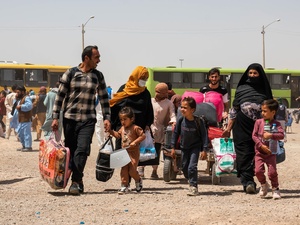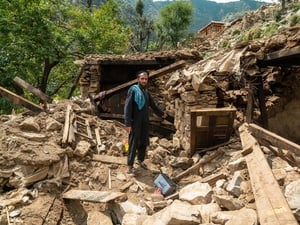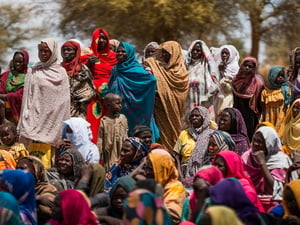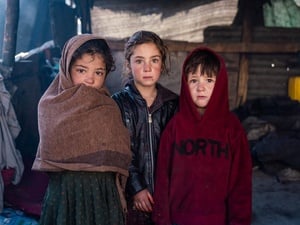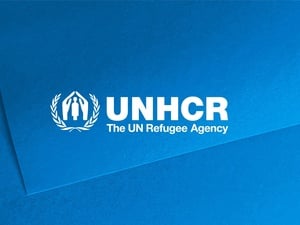Hundreds of Afghans head home with "safe return" guarantee
Hundreds of Afghans head home with "safe return" guarantee
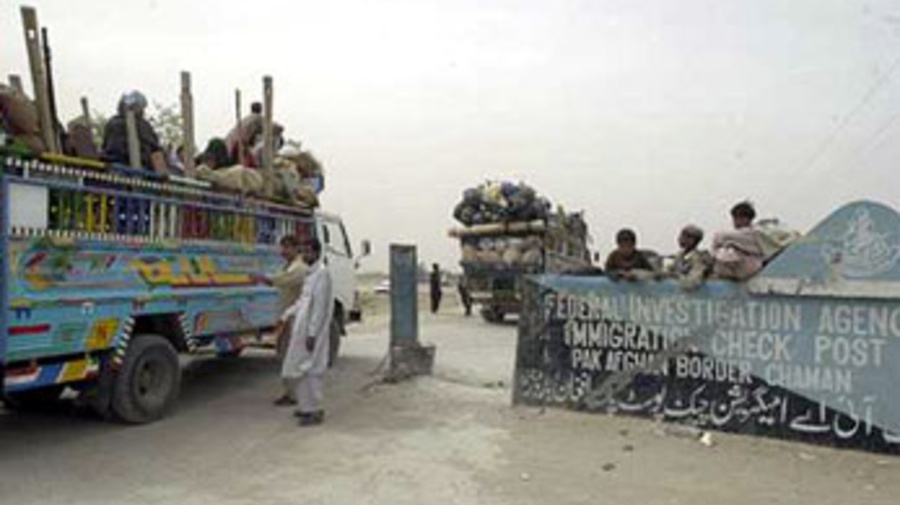
Some 12,000 Afghans in Pakistan have gone home through the Chaman border crossing this year, including a recent convoy of Uzbek Afghans.
QUETTA, Pakistan, May 21 (UNHCR) - A first group of hundreds of ethnic Uzbek Afghan refugees have returned home from Pakistan's Latifabad camp after they approached the UN refugee agency about repatriation concerns and received security assurances from authorities in southern Afghanistan.
On Tuesday, a convoy of 14 trucks carrying 490 Afghans crossed the border at Chaman in western Pakistan and arrived in Spin Boldak, southern Afghanistan. Some of the returnees had expressed concerns about security in their homeland, but decided to repatriate after Afghan authorities guaranteed their protection on the road to Kabul.
Many of the returnees were headed to their home areas in Balkh, Sar-i-Pul and Kabul provinces in central and northern Afghanistan, a trip lasting two to three days due to the rugged conditions along the famed Silk Route trading road.
Ghullam Mohammed, an Afghan refugee returning to Mazar-i-Sharif from Balochistan province's Latifabad camp, had been living in Pakistan for 18 years.
"Now that peace has returned to our places of origin, we made up our minds to return to Afghanistan," said Ghullam. "Our only problem was the insecure situation in the south of the country. We shared our fear with UNHCR, who in return involved the Afghan government and now they have guaranteed our safe return."
Haji Saifi, Resident Director of the Afghan Ministry of Refugees and Repatriation (MoRR), accompanied the repatriating families to Kandahar in southern Afghanistan, from where local authorities took over the protection of the returning group.
"After we received a request from Latifabad camp through UNHCR, I personally visited Kandahar,' said Haji. "There I met the governor, and also spoke to the Ministry for Refugees and Repatriation and Ministry of the Interior, who assured a dignified and safe return for our brothers."
Another returnee, Saad Ullah, was returning to Sar-i-Pul province. He last visited Afghanistan six years ago during the civil war.
"My last visit resulted in disappointment as fighting was going on between several factions inside Afghanistan. This time we are all sure that this peace will last, that's the reason that we are going back in a large group. I hope that others belonging to our areas will follow soon," said Saad.
Since the beginning of this year, more than 65,000 Afghan refugees have returned from Pakistan under the UNHCR-facilitated voluntary repatriation programme. Of these, some 12,000 left through Balochistan province's Chaman border crossing.
Each of the returnees leaving Pakistan undergoes iris-recognition scanning as part of measures UNHCR instituted to help detect individuals who had previously returned home with UN repatriation assistance and food aid.
The UN refugee agency plans to help up to 1.2 million Afghans return home this year from Pakistan, Iran and other countries. But it has so far received only $72 million, or 37 percent of the $194 million required for repatriation and reintegration projects in Afghanistan.


